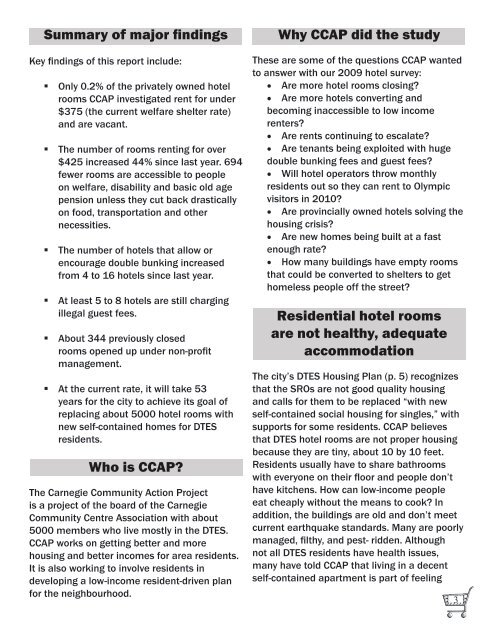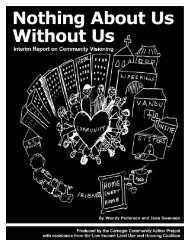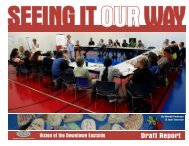Still Losing Hotel Rooms - Carnegie Community Action Project
Still Losing Hotel Rooms - Carnegie Community Action Project
Still Losing Hotel Rooms - Carnegie Community Action Project
Create successful ePaper yourself
Turn your PDF publications into a flip-book with our unique Google optimized e-Paper software.
Summary of major findings<br />
Key findings of this report include:<br />
�<br />
�<br />
�<br />
�<br />
�<br />
�<br />
Only 0.2% of the privately owned hotel<br />
rooms CCAP investigated rent for under<br />
$375 (the current welfare shelter rate)<br />
and are vacant.<br />
The number of rooms renting for over<br />
$425 increased 44% since last year. 694<br />
fewer rooms are accessible to people<br />
on welfare, disability and basic old age<br />
pension unless they cut back drastically<br />
on food, transportation and other<br />
necessities.<br />
The number of hotels that allow or<br />
encourage double bunking increased<br />
from 4 to 16 hotels since last year.<br />
At least 5 to 8 hotels are still charging<br />
illegal guest fees.<br />
About 344 previously closed<br />
rooms opened up under non-profit<br />
management.<br />
At the current rate, it will take 53<br />
years for the city to achieve its goal of<br />
replacing about 5000 hotel rooms with<br />
new self-contained homes for DTES<br />
residents.<br />
Who is CCAP?<br />
The <strong>Carnegie</strong> <strong>Community</strong> <strong>Action</strong> <strong>Project</strong><br />
is a project of the board of the <strong>Carnegie</strong><br />
<strong>Community</strong> Centre Association with about<br />
5000 members who live mostly in the DTES.<br />
CCAP works on getting better and more<br />
housing and better incomes for area residents.<br />
It is also working to involve residents in<br />
developing a low-income resident-driven plan<br />
for the neighbourhood.<br />
Why CCAP did the study<br />
These are some of the questions CCAP wanted<br />
to answer with our 2009 hotel survey:<br />
• Are more hotel rooms closing?<br />
• Are more hotels converting and<br />
becoming inaccessible to low income<br />
renters?<br />
• Are rents continuing to escalate?<br />
• Are tenants being exploited with huge<br />
double bunking fees and guest fees?<br />
• Will hotel operators throw monthly<br />
residents out so they can rent to Olympic<br />
visitors in 2010?<br />
• Are provincially owned hotels solving the<br />
housing crisis?<br />
• Are new homes being built at a fast<br />
enough rate?<br />
• How many buildings have empty rooms<br />
that could be converted to shelters to get<br />
homeless people off the street?<br />
Residential hotel rooms<br />
are not healthy, adequate<br />
accommodation<br />
The city’s DTES Housing Plan (p. 5) recognizes<br />
that the SROs are not good quality housing<br />
and calls for them to be replaced “with new<br />
self-contained social housing for singles,” with<br />
supports for some residents. CCAP believes<br />
that DTES hotel rooms are not proper housing<br />
because they are tiny, about 10 by 10 feet.<br />
Residents usually have to share bathrooms<br />
with everyone on their floor and people don’t<br />
have kitchens. How can low-income people<br />
eat cheaply without the means to cook? In<br />
addition, the buildings are old and don’t meet<br />
current earthquake standards. Many are poorly<br />
managed, filthy, and pest- ridden. Although<br />
not all DTES residents have health issues,<br />
many have told CCAP that living in a decent<br />
self-contained apartment is part of feeling<br />
3




